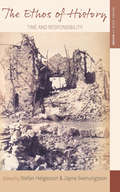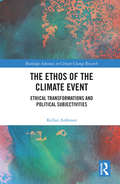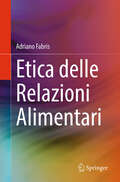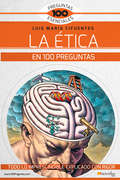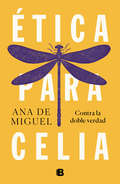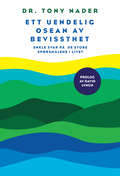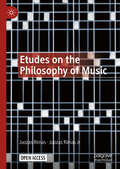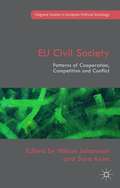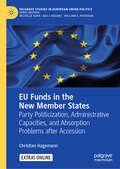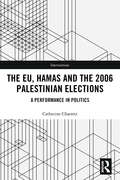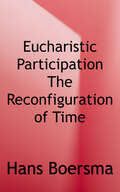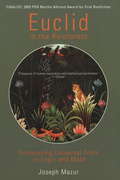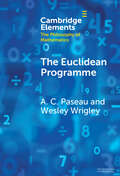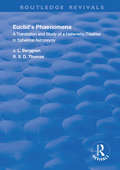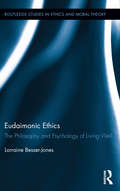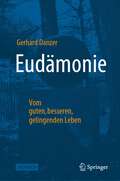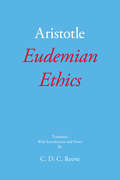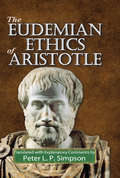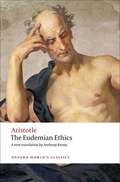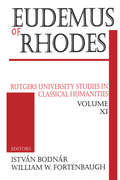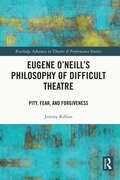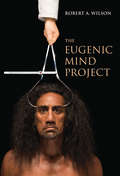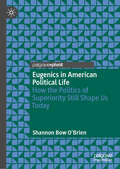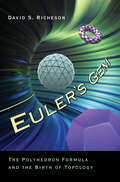- Table View
- List View
The Ethos of History: Time and Responsibility (Making Sense of History #34)
by Stefan Helgesson Jayne SvenungssonAt a time when rapidly evolving technologies, political turmoil, and the tensions inherent in multiculturalism and globalization are reshaping historical consciousness, what is the proper role for historians and their work? By way of an answer, the contributors to this volume offer up an illuminating collective meditation on the idea of ethos and its relevance for historical practice. These intellectually adventurous essays demonstrate how ethos—a term evoking a society’s “fundamental character” as well as an ethical appeal to knowledge and commitment—can serve as a conceptual lodestar for history today, not only as a narrative, but as a form of consciousness and an ethical-political orientation.
The Ethos of History: Time and Responsibility (Making Sense of History #34)
by Stefan Helgesson and Jayne SvenungssonAt a time when rapidly evolving technologies, political turmoil, and the tensions inherent in multiculturalism and globalization are reshaping historical consciousness, what is the proper role for historians and their work? By way of an answer, the contributors to this volume offer up an illuminating collective meditation on the idea of ethos and its relevance for historical practice. These intellectually adventurous essays demonstrate how ethos—a term evoking a society’s “fundamental character” as well as an ethical appeal to knowledge and commitment—can serve as a conceptual lodestar for history today, not only as a narrative, but as a form of consciousness and an ethical-political orientation.
The Ethos of the Climate Event: Ethical Transformations and Political Subjectivities (Routledge Advances in Climate Change Research)
by Kellan AnfinsonThis book develops a politico-ethical response to climate change that accounts for the novelty and uncertainty that it entails. This volume explores the ethical dimensions of climate change and posits that one must view it as a social construction intimately tied to political issues in order to understand and overcome this environmental challenge. To show how this ethos builds upon the need for new forms of responsiveness, Anfinson analyzes it in terms of four features: commitment, worldly sensitivity, political disposition, and practice. Each of these features is developed by putting four thinkers – Kierkegaard, Nietzsche, Schmitt, and Foucault respectively – in conversation with the literature on climate change. In doing so, this book shows how social habits and norms can be transformed through subjective thought and behavior in the context of a global environmental crisis. Presenting a multidisciplinary engagement with the politics, philosophy, and science of climate change, this book will be of great interest to students and scholars of climate change, environmental politics, environmental philosophy and environmental humanities.
Etica delle Relazioni Alimentari
by Adriano FabrisQuesto libro presenta e discute alcuni problemi di fondo che emergono oggi nelle relazioni alimentari e che riguardano i nostri stili di vita. I primi tre capitoli si concentrano sulle questioni che concernono l'alimentazione e sul rapporto con ciò che possiamo o non possiamo mangiare, per motivi etici, religiosi o semplicemente collegati al nostro benessere. Il quarto capitolo tratta dell'atto del bere e del nostro rapporto con l'acqua, nell’ottica della sostenibilità, della giustizia, del corretto uso e dell’equa distribuzione delle risorse idriche. In generale, l’idea che viene sostenuta nel libro è che per gli esseri umani gli atti del mangiare e del bere non dipendono dalla volontà del soggetto, ma si svolgono in contesti di relazione già dati e mettono in gioco, o impediscono, ulteriori relazioni: con altri esseri viventi, con altri esseri umani, con noi stessi. Tali relazioni possono svilupparsi bene oppure male. Se sono attuate male risultano distruttive. Bisogna capire come ciò accade e agire di conseguenza. L’etica ci aiuta a farlo, facendoci riflettere su questi problemi e individuando soluzioni concrete. Scritto per studenti universitari e per studiosi di etiche applicate, il libro è una lettura stimolante e provocatoria anche per un pubblico più ampio.
La Ética en 100 preguntas (100 Preguntas esenciales)
by María Luis Cifuentes PérezLas respuestas de la Ética a los grandes retos del nuevo humanismo: la manipulación genética, el uso de la tecnología, la bioética y la ética ecológica, la ética política, los derechos de los animales, la sostenibilidad y el sistema económico globalizado. ¿Las reglas morales se aprenden o son innatas? ¿Se pueden transgredir las leyes morales? ¿Son los políticos mentirosos compulsivos? ¿Puede haber tantas morales como culturas humanas? ¿Es injusto el actual capitalismo globalizado? ¿Es el ser humano un homo tecnologicus? ¿Constituye el Proyecto Genoma Humano un progreso ético? ¿Se puede ya programar una vida transhumana? ¿Es la especie humana la dueña del universo? ¿Estamos aún a tiempo de no destruir el planeta Tierra?
Ética para Celia
by Ana De MiguelEste libro no es solo una ética para chicas, es también una llamada a los chicos para que se atrevan a transgredir de verdad: para que dejen de ponerse en el lugar de sus deseos y se pongan en el lugar de las demás. La filosofía nos enseña que lo importante son las preguntas que nos hacemos, siempre que formulemos bien nuestros interrogantes y nos preguntemos por el fundamento de nuestros proyectos. La ética, por su parte es una invitación a ponerse en el lugar de los demás, y sucede que hasta ahora los hombres no se han puesto en el lugar de las mujeres. Con ellas ha valido casi todo: desde borrar su nombre y su historia hasta la violencia sexual. La filosofía y, con ella, la ética puede ayudarnos a comprender las enormes contradicciones a las que tienen que enfrentarse las mujeres en un mundo patriarcal al que los filósofos, aun sin haber estado a la altura, sí aportaron una manera de pensar crítica que nos ha llevado a ser conscientes de las desigualdades y a cuestionar el sistema. Ética para Celia nos invita a mirar de frente la realidad, el hecho de que nuestra vida se ha levantado sobre una doble verdad, con normas morales y fines vitales distintos para mujeres y hombres. Esta doble verdad se ha ido transformando, pero no ha desaparecido. A las jóvenes ya no se las socializa con idea de que sean para los demás, pero sí para ser deseables, que no deja de ser otra forma de ser para los otros.
Ett uendelig osean av bevissthet
by Dr. Tony NaderEnkle svar på de store spørsmålene i livet. Prolog av David Lynch. «I denne milepælen av en bok, tilbyr Dr. Nader ideer og tanker som kan forandre verden. Han gir solide løsninger på spørsmål som lenge har fascinert og begeistret filosofer og forskere og dekker mangfoldige områder som hensikten med livet, det gode og det onde, hva er bevissthet, har vi frihet? Finnes det lov og orden eller bare kaos i universet? Hvordan kan vi utjevne forskjeller mellom ateisten og den troende, determinisme og frie valg? Hvordan gjøre det beste utav livet, oppfylle ønsker og skape fred og harmoni mellom mennesker og nasjoner? Han tilbyr disse løsningene basert på et enkelt underliggende paradigme som forener sinn, kropp og miljø i et osean av ren Væren, ren Bevissthet. En bok man må lese hvis man søker svar på mysteriene i livet, den absolutte og ultimate sannhet.»David Lynch «Jeg ønsker at alle skal vite hva Bevissthet er og hvordan man kan utvikle det for å kunne utnytte sitt full potensial som individ og som aktiv deltaker sammen med andre.»Dr. Tony Nader
Etudes on the Philosophy of Music
by Juozas Rimas Juozas Rimas Jr.Drawing on the author's four decades of experience as a concert oboist, this open access book studies a number of foundational issues in the philosophy of music, such as musical meaning and expression, musical ontology and the existence of the musical work, the relation between music and language, and the phenomenology of music. The book surveys the development of Western classical music from the Baroque era through to the 20th century, both from the perspective of contemporary Lithuanian philosophers such as Girnius, Maceina, Šliogeris, and Jackūnas, and 20th century European philosophy. In addition to discussing key questions in the philosophy of music, the book also analyses technical musical terms such as articulation, phrasing, and rhythm.
EU Civil Society: Patterns Of Cooperation, Competition And Conflict (Palgrave Studies in European Political Sociology)
by Sara Kalm H�kan JohanssonThis volume provides a novel and relational sociological approach to the study of EU civil society. It focuses on the interactions and interrelations between civil society actors and the forms of capital that structure the fields and sub-fields of EU civil society, through new and important empirical studies on organized EU civil society.
EU Funds in the New Member States: Party Politicization, Administrative Capacities, And Absorption Problems After Accession (Palgrave Studies in European Union Politics)
by Christian HagemannThis book examines new member states’ problems with the absorption of EU funds. Since accession, many new member states from Central and Eastern Europe struggle to access their billions of development funds from Brussels. While existing research mostly emphasizes the role of states’ administrative capacities to account for absorption problems, this study adds the so far neglected role of politics as party politicization to the equation. The argument is tested using a combination of fuzzy-set Qualitative Comparative Analysis (fsQCA) with two detailed process tracing case studies. This book will appeal to scholars interested in EU cohesion policy, post-accession compliance, and post-communist politics.
The EU, Hamas and the 2006 Palestinian Elections: A Performance in Politics (Interventions)
by Catherine CharrettThis book addresses how institutional and diplomatic rituals shaped the European Union’s sanction of Hamas after the latter’s success in the 2006 Palestinian legislative elections. Through a lens of performance and performativity it explains how socialisation and the duress of performative rituals shapes agency and prevents the possibility of being creative with policy initiatives when confronted with difficult decisions. Interviews with senior Hamas representatives, EU bureaucrats, members of the European External Action Service, and electoral observers from Palestine and Europe, in addition to ethnographic research in Gaza and in Brussels, recreate the details of the failed diplomacy between Hamas and the EU. The book explores the social and visual cultures and discourses that shape the recognition of contemporary subjects, and it presents Hamas’s response to being treated as a terrorist movement. It advances queer and postcolonial understandings of European-Palestinian political encounter by interrogating the bureaucratic and professional pressures that shape the political agency of EU civil servants and the recognition of Palestinian politics. This is a performative and interdisciplinary text; it juxtaposes empirical investigation, with critical theory, performance art and everyday experiences. It will appeal to students of International Relations, Interdisciplinary Studies, Middle-East Area Studies, Foreign Policy and Diplomacy Analysis and Gender Studies.
Eucharistic Participation: The Reconfiguration of Time and Space
by Hans BoersmaThis book deals with the importance of the Eucharist, and in the process challenges Protestants (and especially evangelicals) to treat the Eucharist more seriously than they sometimes do. <p><p>In particular, Boersma re-addresses the two issues of the Lord's Supper as sacrifice and as real presence. These were the two issues central to the Eucharistic debates of the Protestant Reformation. This booklet is written from an attitude of sympathy with the motivations and concerns of the Reformers. At the same time, it suggests that it is possible to get beyond the disagreements of the Reformation period. <p><p>If we take seriously the notion of "participation"-the idea that in the Eucharistic celebration we share in Christ and in his work-we can affirm both "sacrificial" language and talk of "real presence"-while at the same time holding on to the all-sufficient and unique character of Christ's sacrifice. Participation, so Boersma argues, reconfigures our understanding of both time and space. If past, present, and future coincide in and through Christ, this means that what we do today in the Eucharist can participate in the unique sacrifice of Christ without undermining it. <p><p>And if heaven and earth are reunited in and through Christ, this means that the heavenly reality of Christ's body can become really present in the celebration of the Eucharist. Serious ecumenical dialogue requires, therefore, that Protestants do justice to the theology of participation as they try to come to grips with the disagreements between Rome and the Reformation.
Euclid in the Rainforest
by Joseph MazurLike Douglas Hofstadter's Gödel, Escher, Bach, and David Berlinski's A Tour of the Calculus, Euclid in the Rainforest combines the literary with the mathematical to explorelogic--the one indispensable tool in man's quest to understand the world. Underpinning both math and science, it is the foundation of every major advancement in knowledge since the time of the ancient Greeks. Through adventure stories and historical narratives populated with a rich and quirky cast of characters, Mazur artfully reveals the less-than-airtight nature of logic and the muddled relationship between math and the real world. Ultimately, Mazur argues, logical reasoning is not purely robotic. At its most basic level, it is a creative process guided by our intuitions and beliefs about the world.
The Euclidean Programme (Elements in the Philosophy of Mathematics)
by A. C. Paseau Wesley WrigleyThe Euclidean Programme embodies a traditional sort of epistemological foundationalism, according to which knowledge – especially mathematical knowledge – is obtained by deduction from self-evident axioms or first principles. Epistemologists have examined foundationalism extensively, but neglected its historically dominant Euclidean form. By contrast, this book offers a detailed examination of Euclidean foundationalism, which, following Lakatos, the authors call the Euclidean Programme. The book rationally reconstructs the programme's key principles, showing it to be an epistemological interpretation of the axiomatic method. It then compares the reconstructed programme with select historical sources: Euclid's Elements, Aristotle's Posterior Analytics, Descartes's Discourse on Method, Pascal's On the Geometric Mind and a twentieth-century account of axiomatisation. The second half of the book philosophically assesses the programme, exploring whether various areas of contemporary mathematics conform to it. The book concludes by outlining a replacement for the Euclidean Programme.
Euclid's Phaenomena: A Translation and Study of a Hellenistic Treatise in Spherical Astronomy (Routledge Revivals)
by J. L. Berggren R. S. ThomasOriginally published in 1996, this book contains a translation and study of Euclid's Phaenomena, a work which once formed part of the mathematical training of astronomers from Central Asia to Western Europe. Included is an introduction that sets Euclid's geometry of the celestial sphere, and its application to the astronomy of his day, into its historical context for readers not already familiar with it. So no knowledge of astronomy or advanced mathematics is necessary for an understanding of the work. The book shows mathematical astronomy shortly before the invention of trigonometry, which allowed the calculation of exact results and the subsequent composition of Ptolemy's Almagest. This work and the (roughly) contemporaneous treatises of Autolycus and Aristarchos form a corpus of the oldest extant works on mathematical astronomy. Together with Euclid's Optics one has the beginnings of the history of science as an application of mathematics.
Eudaimonic Ethics: The Philosophy and Psychology of Living Well (Routledge Studies in Ethics and Moral Theory)
by Lorraine L BesserIn this book, Lorraine Besser-Jones develops a eudaimonistic virtue ethics based on a psychological account of human nature. While her project maintains the fundamental features of the eudaimonistic virtue ethical framework—virtue, character, and well-being—she constructs these concepts from an empirical basis, drawing support from the psychological fields of self-determination and self-regulation theory. Besser-Jones’s resulting account of "eudaimonic ethics" presents a compelling normative theory and offers insight into what is involved in being a virtuous person and "acting well." This original contribution to contemporary ethics and moral psychology puts forward a provocative hypothesis of what an empirically-based moral theory would look like.
Eudämonie - Vom guten, besseren, gelingenden Leben
by Gerhard DanzerDer Titel Eudämonie verspricht Schönes,Angenehmes, Erbauliches, und alles das will und soll dieses Buch auch leisten. Wervon uns wünschte sich nicht ein gutes und gelingendes Leben, ohne allerdings somir nichts, dir nichts sagen zu können, woraus denn dieses Gute, Schöne undWahre besteht. Wer von uns kennt nicht den intensiven Wunsch nach Glück undZufriedenheit, und wem begegneten bei seiner oder ihrer Suche nach Glück und Zufriedenheitaber nicht schon Hürden und Herausforderungen aller Art, die uns bisweilen rat-und hilflos haben werden lassen? Allein schon aufgrund dieser persönlichen Kalamitäten,die jeder von uns oftmals zu gewärtigen hat, scheint es gerechtfertigt, überEudämonie und damit über die Möglichkeiten eines gelingenden Lebensnachzudenken.
Eudemian Ethics (The New Hackett Aristotle)
by AristotleThis new translation of Aristotle's Eudemian Ethics, noteworthy for its consistency and accuracy, is the latest addition to the New Hackett Aristotle series. Fitting seamlessly with the others in the series, it enables Anglophone readers to read Aristotle&’s works in a way previously impossible. Sequentially numbered endnotes provide the information most needed at each juncture, while a detailed Index of Terms guides the reader to places where focused discussion of key notions occurs.
The Eudemian Ethics of Aristotle
by Peter L. SimpsonAmong the works on ethics in the Aristotelian corpus, there is no serious dispute among scholars that the Eudemian Ethics is authentic. The Eudemian Ethics is increasingly read and used by scholars as a useful support and confirmation and sometimes contrast to the Nicomachean Ethics. Yet, it remains a largely neglected work in the study of Aristotle's ethics, both among scholars and moral philosophers.Peter L. P. Simpson provides an analytical outline of the entire work together with summaries of each individual section, making the overall structure and detailed argument clear. His translation and explanatory notes include the common books that the Eudemian Ethics shares with the Nicomachean. This translation contains renderings of words and phrases, and proposals for emending the text that differ from what other translators and scholars have adopted.This translation is literal, without expansion or paraphrase, and yet also readable. A readable but literal translation is necessary because in the Eudemian Ethics, more than usual in Aristotle's writings, the logic of the argumentation can turn on the peculiar wording or order. Simpson explains the argumentation where necessary in notes and separate explanatory comments. This book is a fresh, twenty-first-century rendition of the work of one of the most eminent philosophers of all time.
The Eudemian Ethics (Oxford World's Classics)
by Anthony Kenny Aristotle"We are looking for the things that enable us to live a noble and happy life. . . and what prospects decent people will have of acquiring any of them. "The Eudemian Ethics is a major treatise on moral philosophy whose central concern is what makes life worth living. Aristotle considers the role of happiness, and what happiness consists of, and he analyses various factors that contribute to it: human agency, the relation between action and virtue,and the concept of virtue itself. Moral and intellectual virtues are classified and considered, and finally the roles of friendship and pleasure. It deals with the same issues as the better-known Nicomachean Ethics, with which it holds three books in common, and its special qualities, as well asthe similarities and differences between the two works, are of fundamental concern to anyone interested in Aristotle's philosophy. This is the first time the Eudemian Ethics has been published in its entirety in any modern language. Anthony Kenny's fine translation is accompanied by a lucid introduction and explanatory notes, which assist the reader in understanding this important work.
Eudemus of Rhodes (Rutgers University Studies in Classical Humanities)
by William FortenbaughEudemus of Rhodes was a pupil of Aristotle in the second half of the fourth century BCE. When Aristotle died, having chosen Theophrastus as his successor, Eudemus returned to Rhodes where it appears he founded his own school. His contributions to logic were significant: he took issue with Aristotle concerning the status of the existential "is," and together with Theophrastus he made important contributions to hypothetical syllogistic and modal logic. He wrote at length on physics, largely following Aristotle, and took an interest in animal behavior. His histories of geometry, arithmetic, and astronomy were of great importance and are responsible for much of what we know of these subjects in earlier times.Volume 11 in the series Rutgers Studies in Classical Humanities is different in that it is composed entirely of articles that discuss Eudemus from a variety of viewpoints. Sixteen scholars representing seven nations have contributed essays to the volume. A special essay by Dimitri Gutas brings together for the first time the Arabic material relating to Eudemus. Other contributors and essays are: Hans B. Gottschalk, "Eudemus and the Peripatos"; Tiziano Dorandi, "Quale aspetto controverso della biografia di Eudemo di Rodi"; William W. Fortenbaugh, "Eudemus' Work On Expression"; Pamela M. Huby, "Did Aristotle Reply to Eudemus and Theophrastus on Some Logical Issues?"; Robert Sharples, "Eudemus Physics: Change, Place and Time"; Han Baltussen, "Wehrli's Edition of Eudemus of Rhodes: The Physical Fragments from Simplicius' Commentary on Aristotle's Physics"; Sylvia Berryman, "Sumphues and Suneches: Continuity and Coherence in Early Peripatetic Texts"; Istvbn Bodnbr, "Eudemus' Unmoved Movers: Fragments 121-123b Wehrli"; Deborah K. W. Modrak, "Phantasia, Thought and Science in Eudemus"; Stephen White, "Eudemus the Naturalist"; J orgen Mejer, "Eudemus and the History of Science"; Leonid Zhmud, "Eudemus' History of Mathematics"; Alan C. Bowen, "Eudemus' History of Early Greek Astronomy: Two Hypotheses"; Dmitri Panchenko, "Eudemus Fr. 145 Wehrli and the Ancient Theories of Lunar Light"; and Gbbor Betegh, "On Eudemus Fr. 150 Wehrli.""[Eudemus of Rhodes] marks a substantial progress in our knowledge of Eurdemus. For it enlarges the scope of the information available on this author, highlights the need of, and paves the way to, a new critical edition of the Greek fragments of his works, and provides a clearer view of his life, thought, sources and influence. In all these respects, it represents a necessary complement to Wehrli's edition of Eudemus' fragments." -Amos Bertolacci, The Classical BulletinIstvbn Bodnbr is a member of the philosophy department at the Eotvos University in Budapest, where he teaches and does research on ancient philosophy. He has been a junior fellow at the Center for Hellenic Studies and most recently has been an Alexander von Humboldt Stipendiat in Berlin at the Max Plank Institut for Wissenschaftsgeschichte and at the Freie Universitot.William W. Fortenbaugh is professor of classics at Rutgers University. In addition to editing several books in this series, he has written Aristotle on Emotion and Quellen zur Ethik Theophrastus. New is his edition of Theophrastus's treatise On Sweat.
Eugene O'Neill's Philosophy of Difficult Theatre: Pity, Fear, and Forgiveness (Routledge Advances in Theatre & Performance Studies)
by Jeremy KillianThrough a close re-examination of Eugene O’Neill’s oeuvre, from minor plays to his Pulitzer-winning works, this study proposes that O’Neill’s vision of tragedy privileges a particular emotional response over a more “rational” one among his audience members. In addition to offering a new paradigm through which to interpret O’Neill’s work, this book argues that O’Neill’s theory of tragedy is a robust account of the value of difficult theatre as a whole, with more explanatory scope and power than its cognitivist counterparts. This paradigm reshapes our understanding of live theatrical tragedy’s impact and significance for our lives. The book enters the discussion of tragic value by way of the plays of Eugene O’Neill, and through this study, Killian makes the case that O’Neill has refused to allow Plato to define the terms of tragedy’s merit, as the cognitivists have. He argues that O’Neill’s theory of tragedy is non-cognitive and locates the value of a play in its ability to trigger certain emotional responses from the audience. This would be of great interest to students and scholars of performance studies, literature and philosophy.
The Eugenic Mind Project (The\mit Press Ser.)
by Robert A. WilsonAn examination of eugenic thinking past and present, from forced sterilization to prenatal screening, drawing on experience with those who survived eugenics.Part science and part social movement, eugenics emerged in the late nineteenth century as a tool for human improvement. In response to perceived threats of criminality, moral degeneration, feeble-mindedness, and “the rising tide of color,” eugenic laws and social policies aimed to better the human race by regulating reproductive choice through science and technology. In this book, Rob Wilson examines eugenic thought and practice—from forced sterilization to prenatal screening—drawing on his experience working with eugenics survivors. Using the social sciences' standpoint theory as a framework to understand the intersection of eugenics, disability, social inclusiveness, and human variation, Wilson focuses on those who have lived through a eugenic past and those confronted by the legacy of eugenic thinking today. By doing so, he brings eugenics from the distant past to the ongoing present. Wilson discusses such topics as the conceptualization of eugenic traits; the formulation of laws regulating immigration and marriage and requiring sexual sterilization; the depiction of the targets of eugenics as “subhuman”; the systematic construction of a concept of normality; the eugenic logic in prenatal screening and contemporary bioethics; and the incorporation of eugenics and disability into standpoint theory. Individual purchasers of this book will receive free access to the documentary Surviving Eugenics, available at EugenicsArchive.ca/film.
Eugenics in American Political Life: How the Politics of Superiority Still Shape Us Today
by Shannon Bow O'BrienThe book explores the development of the American eugenics movement and how it still plays a role in American life. Building on a brief overview of the concept of eugenics, Shannon Bow O’Brien charts the foundations of the ideas, significant influences, and influencers of the movement in the last 19th and early 20th centuries. She discusses how these ideals and social life shaped American culture and encouraged attitudes toward racial and ethnic biases, including immigration policies in that period. O’Brien examines how the founding of the United States of America was built on unwanted individuals from the United Kingdom; transported felons and indentured servants were many of the original colonists. As the population forged its new nation, many of these individuals were the focus of restrictive immigration policies that sought to amend the identity of the American citizen and sought to define acceptable roles for Black persons within American society. Faithful slave monuments provided physical models to help engrain these roles within American life. O’Brien traces the development of the Mammy statue movement and its intersectionality with the restrictive immigration laws. Finally, she turns to the rhetoric of Donald Trump and contextualizes his speech in the ideology of the superiority of White Nordic nativism within American life.
Euler's Gem
by David S. RichesonLeonhard Euler's polyhedron formula describes the structure of many objects--from soccer balls and gemstones to Buckminster Fuller's buildings and giant all-carbon molecules. Yet Euler's formula is so simple it can be explained to a child. Euler's Gem tells the illuminating story of this indispensable mathematical idea. From ancient Greek geometry to today's cutting-edge research, Euler's Gem celebrates the discovery of Euler's beloved polyhedron formula and its far-reaching impact on topology, the study of shapes. In 1750, Euler observed that any polyhedron composed of V vertices, E edges, and F faces satisfies the equation V-E+F=2. David Richeson tells how the Greeks missed the formula entirely; how Descartes almost discovered it but fell short; how nineteenth-century mathematicians widened the formula's scope in ways that Euler never envisioned by adapting it for use with doughnut shapes, smooth surfaces, and higher dimensional shapes; and how twentieth-century mathematicians discovered that every shape has its own Euler's formula. Using wonderful examples and numerous illustrations, Richeson presents the formula's many elegant and unexpected applications, such as showing why there is always some windless spot on earth, how to measure the acreage of a tree farm by counting trees, and how many crayons are needed to color any map. Filled with a who's who of brilliant mathematicians who questioned, refined, and contributed to a remarkable theorem's development, Euler's Gem will fascinate every mathematics enthusiast.
